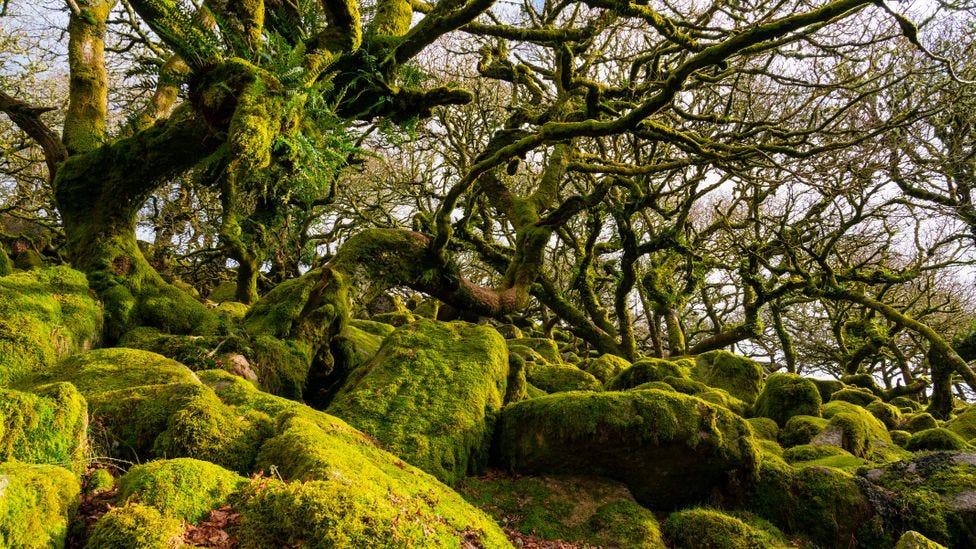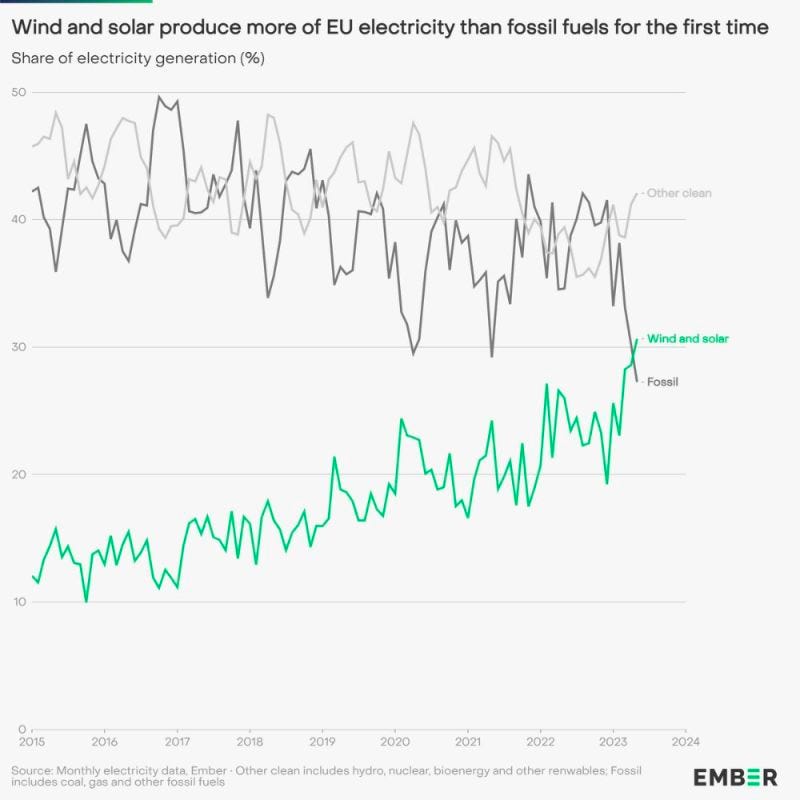🌱 The Grumpy Optimists #95
How much time do we have left to stop climate change and can we even do it?
Happy Monday. 👋
Welcome back to another episode of The Grumpy Optimists, and while as always, I have positive news to share, I also feel like I must start this blog post without highlighting the current state of the planet and why probably for the first time I have some climate anxiety. Let’s have a quick recap before some positivity.
🥵 The planet is well hot, it could well be too hot
This week has been significant in the history of our planet. Greenhouse gases in the atmosphere have reached an all-time high, wildfires in Canada have turned the US East Coast into a disturbing tableau of air pollution, with apocalyptic videos circulating online. Meanwhile, scientists are predicting that it's too late to save the summer Arctic sea ice. To add to that, there's a frightening surge in the North Atlantic sea surface temperature. Yikes.
That big red line below for 2023 paints a somewhat daunting chart of rapid heating of the Atlantic’s surface where the top few meters hold more energy than our entire atmosphere, so yes, this is pretty important. Currently, there are few explanations for the sudden rise in temperature. However, we do know that the sea surface temperature has spiked rapidly ever since we began burning fossil fuels - hardly surprising, is it?


What Does This Mean for Our Planet?
Evidently, the situation isn't great. It appears that the climate models may have underestimated the severity of the issue. Our planet is heating up and reaching tipping points sooner than we thought. The escalating temperature and volume of greenhouse gases in our atmosphere are rapidly consuming our carbon budget. This puts us on a trajectory where we need to achieve net zero emissions by 2035 instead of 2050, or we must reduce our emissions by much more than 50% by 2030, according to Joeri Rogelj, a professor at Imperial.
Can We Be Optimistic?
If there's anything to learn from the events of the past week, it's that they have caught the attention of some of the world's major decision-makers, including those in the US. When climate change impacts 'us', not just 'them' in a distant country or region, it commands attention. As I write this on a sweltering 30°C Sunday in London, I'm feeling a pressing need for more action. So, when the smoke from a Canadian wildfire fills the boardroom of a Wall Street bank, perhaps its executives will think twice about financing further destruction of our planet. Maybe that's just me clinging onto the hope that everything will eventually be okay.
Well, there’s the grumpy, let’s highlight some positive news from the last week. Sorry for fuelling any climate anxiety when you read this. 🙃
👀 Articles to read
🌞 Spain to generate over 50% of power from renewables this year. Spain is on track to generate more than half of its power from renewable sources in 2023, making it the first of the top five European countries to do so. Spain's success is due to a number of factors, including its favourable solar resources, its strategic investments in renewable energy, and its supportive policies.
🛢️ Shell adverts banned for greenwashing. The Advertising Standards Authority (ASA) ruled that the ads gave the impression that Shell was predominantly a clean energy provider, when in fact fossil fuels make up the vast majority of its business. The ruling comes as the ASA is stepping up its efforts to combat greenwashing, with a number of other companies recently being censured for making misleading environmental claims.
💨 Ørsted and Vestas combine to make net zero wind farms. The two energy companies have forged a partnership that will use low-carbon steel towers and recycled materials for blades to cut the carbon emissions of building a wind farm by up to 70%.
🌴 Wildlife-rich rainforest planted in Devon. That’s right a 30-hectare site in Devon, in the UK, will become home to a new temperate rainforest of mosses, lichens and ferns. The UK used to be covered by around 20% rainforest, but that figure has now fallen to just below 1% of the total land area.
🔋 Wind and solar produce more electricity than fossil fuels in the EU in May for the first time. Solar generation hit an all-time high of 27 TWh, while wind power generated 32 TWh. This means that wind and solar combined accounted for 31% of the EU's electricity, while fossil fuels generated 27%. The new milestone was driven by a number of factors, including, record solar growth from years of installation, strong wind performance and low electricity demand due to mild weather. It’s a huge win and a positive sign for the future.
📹 Videos to watch
This week’s episode was written after consuming my first peas from the garden and to the wholesome sound of Rachel Chinouriri. I hope you all have a fantastic week, please continue to share with your friends and colleagues!
The Grumpy Optimists 💚




